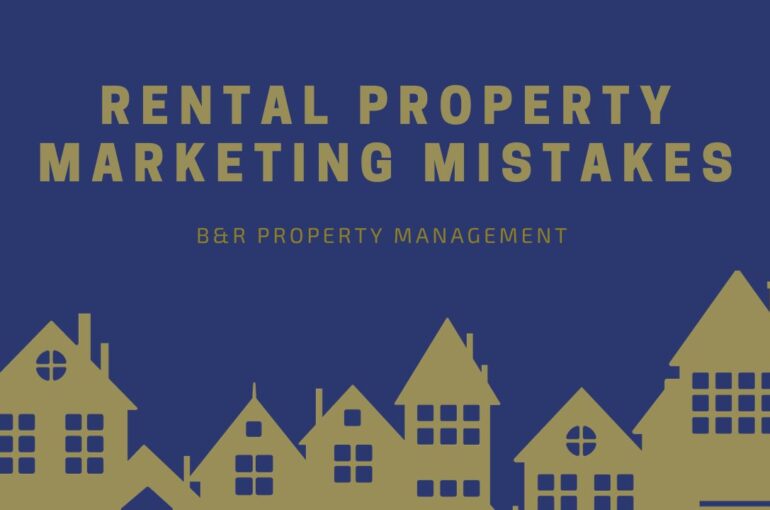Rental Property Marketing Mistakes
Rental Property Marketing Mistakes

In this competitive rental industry, effective marketing is crucial for landlords looking to attract quality tenants and maximize returns on their rental properties. However, many landlords fall victim to common marketing mistakes that can hinder their success.
Here are the top rental property marketing mistakes landlords should avoid:
1. Neglecting Professional Photography
One of the most common mistakes landlords make is underestimating the power of high-quality images. Neglecting professional photography can significantly impact a property’s appeal. As the saying goes, a picture is worth a thousand words.
In the digital age, renters often make decisions based on online property listings, making it crucial to showcase the unit in the best possible light.
Investing in professional photography can lead to increased interest and faster tenant acquisition. High-resolution images capture the essence of the property and create a positive first impression, driving potential tenants to schedule viewings.
2. Inadequate Property Descriptions
An engaging and informative property description is essential for attracting the right tenants. Some landlords make the mistake of providing generic or insufficient details about their rental properties. Crafting compelling property descriptions that highlight key features, amenities, and unique aspects of the property is essential.
Landlords should aim to create a narrative that paints a vivid picture of the lifestyle tenants can enjoy in the space. Including information about nearby attractions, schools, and public transportation options can further enhance the property’s appeal.
3. Ignoring Online Presence

In today’s digital age, a strong online presence is non-negotiable for successful rental property marketing. Some landlords make the mistake of relying solely on traditional methods, neglecting the vast reach of online platforms. You should leverage various online channels, including real estate websites, social media platforms, and property management apps.
Creating a professional and user-friendly website for your rental property can provide a centralized platform for potential tenants to access information, view images, and contact the landlord. Social media platforms also offer opportunities to engage with a broader audience and generate interest in the property.
4. Setting Incorrect Rental Prices
Determining the right rental price is a delicate balance that many landlords struggle to achieve. Setting the rent too high can discourage potential tenants, while pricing it too low may raise questions about the property’s quality. Landlords should conduct thorough market research and consider factors such as location, amenities, and property conditions when setting rental prices.
Regularly reassessing and adjusting rental prices based on market trends is essential for staying competitive. Utilizing online tools and consulting with real estate professionals can help landlords make informed decisions when pricing their rental properties.
5. Neglecting Property Maintenance
A well-maintained property not only attracts quality tenants but also contributes to positive word-of-mouth marketing.
Some landlords make the mistake of neglecting routine maintenance, which can lead to a decline in the property’s appeal and value. Addressing maintenance issues promptly and conducting regular inspections to identify and resolve potential problems is crucial.

Investing in property maintenance not only enhances the tenant experience but also reflects positively on the landlord’s reputation. Happy tenants are more likely to renew leases and recommend the property to others.
6. Overlooking Tenant Screening
Tenant screening is a critical step in the rental process that some landlords underestimate. Failing to conduct thorough background checks can lead to problematic tenants, late payments, and potential legal issues. Landlords must implement a comprehensive tenant screening process that includes credit checks, rental history verification, and criminal background checks.
By thoroughly vetting potential tenants, landlords can minimize the risk of renting to individuals with a history of financial instability or disruptive behavior. This proactive approach can save landlords time, money, and stress in the long run.
7. Limited Advertising Strategies
Relying on a single advertising strategy is a common marketing mistake made by landlords. Landlords should diversify advertising efforts to reach a broader audience. In addition to online platforms, landlords should explore traditional marketing methods, such as yard signs, local publications, and community bulletin boards.
Collaborating with local businesses and real estate professionals can also expand the property’s visibility. Networking and building relationships within the community can lead to valuable referrals and increased interest in the rental property.
8. Appealing to the Wrong Audience

Some landlords make the mistake of not tailoring their marketing efforts to the preferences and needs of their ideal tenants. By tailoring marketing messages and property features to the specific needs and interests of the target audience, landlords can increase the likelihood of attracting tenants who are a good fit for the property.
9. Not Knowing Landlord-Tenant Law
Legal compliance is a cornerstone of successful property management. Landlords should invest time in understanding local and state landlord-tenant laws, ensuring that their rental agreements, eviction processes, and property management practices align with legal standards.
10. Not Understanding the Market
A thorough understanding of the local real estate market is essential for effective property marketing. Landlords should stay informed about market trends, rental demand, and competing properties in the area.
Regularly monitoring market conditions and adjusting marketing strategies accordingly allows landlords to stay competitive and make informed decisions about their rental properties.
11. Failing to Comply with Fair Housing Rules
Fair housing rules are in place to prevent discrimination in housing. Landlords should educate themselves on fair housing rules, treating all applicants and tenants fairly and consistently. Implementing policies and procedures that align with these regulations is essential for maintaining a positive and legally sound rental property business.

Conclusion
Marketing is an essential step to successful rental property ownership, and avoiding these rental property marketing mistakes is crucial for landlords seeking to maximize returns and attract quality tenants. If you’re not sure of what to do, consider partnering with a reliable property management company like B&R Property Management.
Contact us today to learn how we can best serve you and your rental business!



